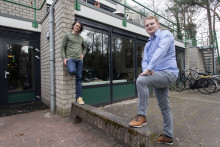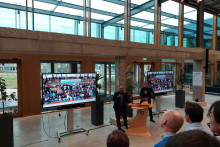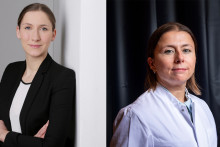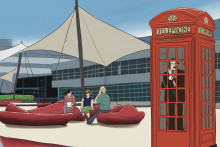For a group of UT students, the possible change to the right of co-optation, which allows campus residents to choose their own roommates, was the straw that broke the camel's back. ‘This is yet another time that we students have been screwed,’ says Niels de Groot. He is a student of Business Information Technology at the UT. ‘That's why we want to protest.’ A WhatsApp group and two participation evenings later, and the Protest Action Group (PAG) was born.
PAG (‘a working title’) consists of some 95 activists studying at the UT. The group does not only focus on co-optation, says initiator De Groot. ‘But we do regard co-optation as an urgent issue. It is clear that the UT wants to get rid of it as soon as possible. Two members of the Executive Board will be leaving shortly. It feels to us as if they are using it as a final prestige project. But abolishing the right of co-optation is very radical. The university is interfering in our own living environment.’
Pseudo-participation
On the basis of two consultation evenings, the PAG drew up three key points: more transparency and democracy, limiting growth and tackling the study pressure. According to the students, the University Council, the current participation body at the UT, is no match for the experienced managers in the Executive Board. ‘It is a pseudo-representative body,’ says co-initiator Jelle van den Wijngaard, bachelor student in Computer Science. ‘The board knows the thick dossiers like the back of its hand, while the students in the University Council receive a stack of fifty A4s to plough through a week in advance.’
‘The intention to keep growing is naive'
‘As is well known, students also have to study alongside their work for the University Council,’ continues Van den Wijngaard. ‘This imbalance in knowledge and management experience makes it virtually impossible to have serious discussions about important issues.’ Van den Wijngaard bases his argument in part on conversations with former board members and University Council members during participation evenings. ‘I won't mention any names, but there were former Student Union members, former board members of study associations, people from the Sportkoepel and University Council members. They are – or were – all close to the UT board.'
Growing pains
According to Van den Wijngaard, many of the problems can be traced back to the 'bizarre growth' in student numbers at the UT. ‘We notice it ourselves: the quality of education is going down. In addition, the facilities for students are also under pressure due to the enormous growth. Housing is one example. By abolishing the right of co-optation, the Executive Board is merely putting a band-aid on the problem: it will be easier for internationals to find a campus house, but it won't solve the real problem – the shortage of student housing. It is purely treating the symptoms.’
The activists believe that the UT is stuck in the funding model for higher education. ‘The university receives money per student,’ says De Groot. ‘But more students – and thus more money – does not lead to better education.’ Van den Wijngaard provides an example. ‘During my first year there were 62 other first-year students. Last academic year there were almost three hundred first-year students in Computer Science. With such a gigantic growth, it is impossible to maintain the quality of education, even with extra money.'
Why doesn't the university sound the alarm at the ministry about this financing model? Why are there not more numeri fixi? The students wonder. ‘The intention to keep growing is naive,' says De Groot. ‘You can also go to the ministry and say: we cannot grow any further. But the sense of urgency seems to be completely absent at the Executive Board.’

Rushed
The growth is to a great extent explained by the increased number of international students. According to the UT itself, it wants an international classroom where students, as global citizens, encounter different cultures. De Groot and Van den Wijngaard are also in favour of this. But according to the two students, internationalization is currently taking place in too much of a rush and the adverse effects have not been properly considered.
'The UT's policy makes student activism impossible'
Van den Wijngaard: 'Internationalization goes beyond its purpose now. Universities compete with each other for as many students as possible, or rather: for as much money as possible. The entry requirements for international students are low and some teachers still have poor English language proficiency – the new official language at the UT. This is not helping the quality of education at our university.’
Study pressure
The two students realize that almost all problems are not UT-specific. ‘That is what makes it so complicated,’ says Van den Wijngaard. For example, the third core problem of PAG, the increasing study pressure, is rather a national problem, which is related to the abolition of the basic grant and the introduction of the binding study advice (BSA). However, according to the students, the Twente Education Model (TOM) – which is specific to the UT – has not contributed to a decrease in study pressure. On the contrary.
The high study pressure leaves little room for activism and real student life, the activists claim. ‘While the UT presents itself as the most entrepreneurial university,’ says De Groot. ‘But you can't boast about student activism if your own policies make it impossible.’ Van den Wijngaard: 'Now there are always a few older students to do the jobs, but that will stop eventually.’
Action
The students do not yet know what their future actions will look like. First, they want to work on the themes in working groups. ‘So that we can present good arguments to the Executive Board,' says van den Wijngaard. ‘Especially with Covid, it is still unclear what we can do. Maybe we'll hand in a manifesto or a letter.’ According to De Groot, it will not be a 'disruptive' protest. ‘But we have said half-jokingly: what if we stop all student activism for a while? No Kick-In, no Open Days and no student life. That would have an enormous effect. Then it will become clear how valuable students are.’
This is how the Executive Board reacts
The Executive Board was not yet aware of the action group, says President Victor van der Chijs, who was given the article for perusal. ‘I think we should have a cup of coffee soon. The students want to take action and are taking it head on. To be honest, I find that a bit of a strange order. Let's talk first.'
‘We were quite surprised by the students' statements,' Van der Chijs continues. ‘As members of the Executive Board we want to know what students think and what their concerns are, because student satisfaction and student welfare are very important to us. We have continuous discussions about this with the University Council, the Student Union and the other student boards. We certainly don't make policy 'blindly' and you can always approach us easily. I think that's what the UT is known for.’
‘There are also things being said that make me think: is this really the case? The comments about the departing members of the Executive Board, for example. When I arrived here seven and a half years ago, co-optation was already on the agenda. Even then, we as the Executive Board felt that the current co-optation system has disadvantages and that 'something' had to change. We are still of the same opinion. Within the system, international students are excluded – and that also applies to a sufficient number of Dutch students. That's why we have to discuss it, because we want to be an inclusive university.'
Nor is there any question of an unlimited growth, according to the President of the university. ‘There is no blind urge to grow at the UT. We meet society's demand for talent. This policy has been brought about through proper procedures and discussions. At Twente, we are also committed to personal and small-scale education. It is not for nothing that the National Student Survey has voted us the best technical university in the Netherlands three years in a row.’
The UT – in consultation with the VSNU (the Association of Universities in the Netherlands, ed.) – has also been sounding the alarm on the financing of higher education for years, says Van der Chijs. ‘A recently published report by the research bureau PWC showed that scientific education and research in the Netherlands faces an annual deficit of 1.1 billion euros. Universities are under enormous pressure due to these shortages.’
The President of the Executive Board would like to include a member of the University Council in the discussion with the activists. ‘Because I think the qualifications about the University Council are wrong. I think our University Council is very critical and outspoken. And that is very pleasant, by the way. Our experience is that most student members have settled in within a month. They give us an excellent retort.’







